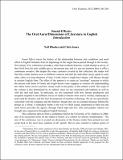Sound effects : The oral/aural dimensions of literature in English Introduction
Abstract
Sound Effects traces the history of the relationship between oral conditions and aural effect in English literature from its beginnings in the Anglo-Saxon period through to the twenty-first century. Few collections nowadays, other than textbook histories, would attempt a survey of their field from the early middle ages to the present day, and it is not our intention here to offer a continuous narrative. But despite the many centuries covered by this collection, the reader will find that certain themes recur in different contexts and that the individual essays speak to each other, often over long distances of time. It ends where it might have begun, with Homer, though in modern English form. The effect of this pattern is to create an “envelope” structure in which the ancient oral forms of Greek and Anglo-Saxon verse reappear as contexts for understanding how these forms survive and how sound works in the poetry of the modern world. The scope of the volume is also determined by its subject, since we are concerned with tradition as well as with the oral and aural. In particular, we are concerned with how literary production and reception respond to the different waves of media evolution from oral to written, manuscript to print (and the theater), and the later development of machine technology. We are not specifically concerned with the computer and the Internet, though they are an unstated presence behind the project as a whole. A subsidiary theme is the way in which sound, understood in both oral and aural terms, provides the agency through which high and low, elite and popular cultures are brought into conjunction throughout English literature.
Citation
Jones , C & Rhodes , N 2009 , ' Sound effects : The oral/aural dimensions of literature in English Introduction ' , Oral Tradition , vol. 24 , no. 2 , pp. 281-292 .
Publication
Oral Tradition
Status
Peer reviewed
ISSN
0883-5365Type
Journal article
Collections
Items in the St Andrews Research Repository are protected by copyright, with all rights reserved, unless otherwise indicated.

